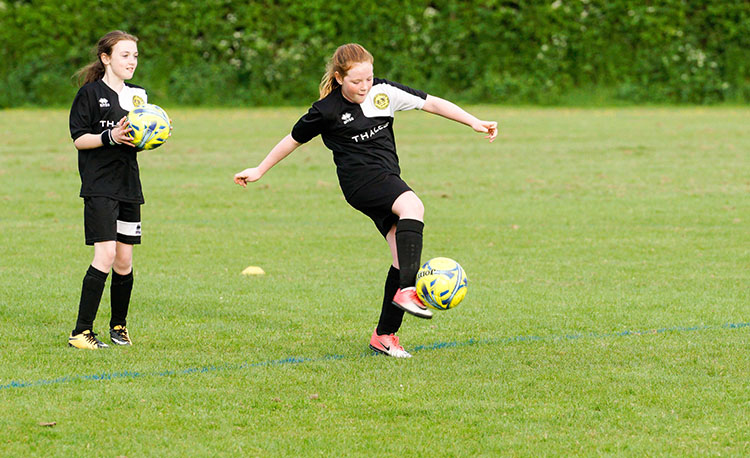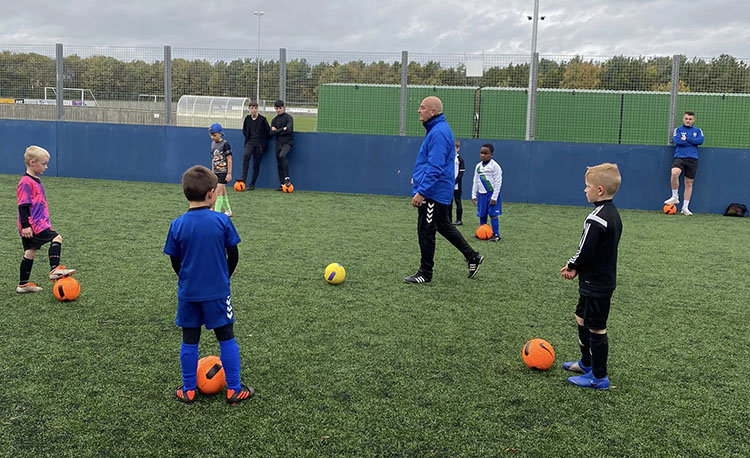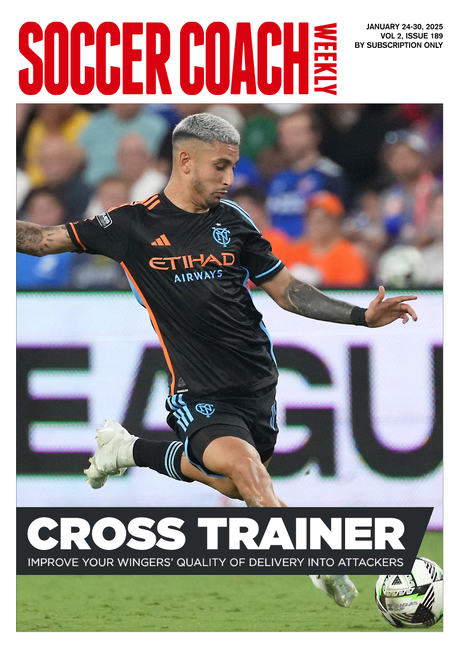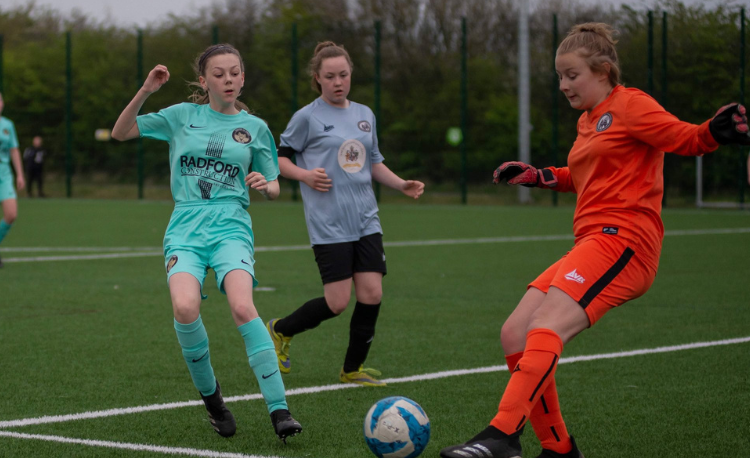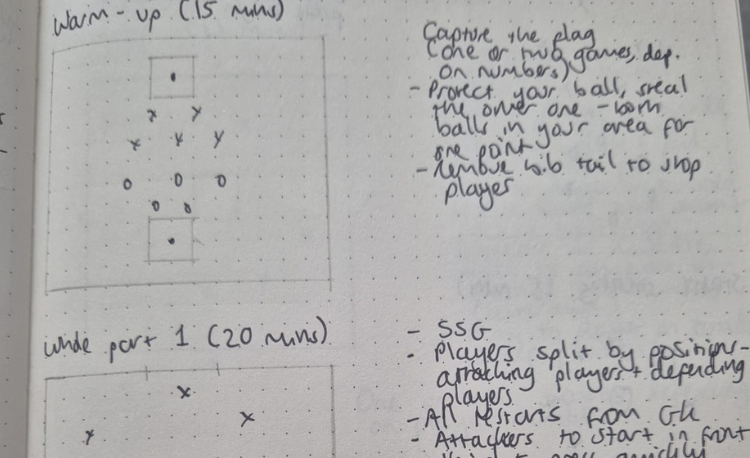How should you coach mixed ability groups?
STEPH FAIRBAIRN asks three coaches for advice on bridging the skills gap...
For coaches working at grassroots, running mixed-ability sessions and managing mixed-ability teams is inevitable.
It can be tough to offer every player, regardless of ability, the chance to enjoy and improve within one short training session.
Similar can be said about one-off events, such as holiday camps, where players with a range of different experiences and motivations often attend.
We spoke to three coaches about how they go about planning and adapting their sessions so there is something for everyone…
’INDIVIDUAL FEEDBACK IS REALLY IMPORTANT
"This is an important, but very difficult, part of coaching, especially in grassroots, where that big range of ability might be present.
"You can design practices where, if you’ve got different pitches, winners move up and you get stronger players against stronger players, so they have got a relevant challenge to them.
“For me, it’s about trying to identify different ways you can change practices to provide challenges for different individuals.
"Something I’ve seen recently is a coach giving the players a choice. Players were practising some dribbling skills unopposed to start, then they went to 1v1s.
"I think it’s probably typical that if you were doing ball manipulation or dribbling skills to then go into a 1v1 - straight away you’ve got that pressure of a defender. But this coach offered a ’practice or play’ approach.
“If we’re working together and I’ve passed you the ball, and you’re trying to use your dribbling skills to get past me, as I receive the ball from you, I would say ’practice’ or ’play’.
"If I say ’practice’, it means I don’t want you to tackle me but you can come and put pressure on me just so I can get comfortable. But if I say ’play’, then it’s live and you can tackle me.
“If you like more game-based approaches, to provide a bit more of a challenge or a little bit more support for other players, it might be underloads and overloads.
"It might be players that are really striving have less players on their team, so they have to deal with different challenges, whereas other players might have a few more to give them more support.
“One thing, aside from the practices, that’s very important for that sort of differentiation and helping different ability levels within the session is the feedback from the coach.
"If you have individual feedback with different players, I feel that’s very useful. It’s not just that blanket approach of ’this is what we’re focusing on, this is what you should be able to do’, it’s actually recognising this player needs help.
“It might be before receiving the ball, they need to work on getting a bit more space away from their defender.
"That might be where you can add in different aspects, as well - for example, you can’t tackle them until they’ve had their first touch, or something like that.
"I think that individual feedback, and being able to provide that support on an individual basis is really important."
GEORGE ROBERTS
Academy coach, Plymouth Argyle FC
’WE HAVE TO BE INCLUSIVE FOR EVERYBODY’
"Kids need to feel some sort of success when playing any game - otherwise, they’ll pack it in.
"If it is too hard, they’ll walk away from it. If it is too easy, they’ll want the next challenge, like a computer game.
“We have little transfer windows which allow us to say ’you’re going across to that team for £4 million, and you’re coming here for £4 million,’ knowing that you’re balancing it off, and not just doing it to get somebody results.
"It’s no different to being at school: you have someone who wants to be in the orchestra, but you’ve also got somebody with the triangle. We have to be inclusive for everybody.
“For clubs who have got lots of teams, if all the best players are spread out, then either they will leave and go to another place or they will get scouted.
"It’s about making sure that competition is meaningful for them. If it’s too easy, it’s pointless and they get a false sense of where they are in football.
“We talk about game time, as well. If I’m being taken off, and I know the next player coming on is as good as me, that makes me feel better.
"We all have to try and identify what we’re trying to do - to get kids to reach their full potential and retaining them in the game as well.
“We need to make sure that they get to learn. Some have to work a bit harder - they might have to do a little bit of homework on certain techniques or skills - and those that want to be better will go away and practice as well."
ROB ATKIN
Football development officer, Blyth Town FC
’IT’S ABOUT UNDERSTANDING YOUR PLAYERS’
"Managing differences in ability in sessions is a question that comes up from a lot of people.
"I think it’s about understanding your players. If you find out what makes them tick, you have a better chance of helping them on their development journey.
"Within a squad of 15 to 18 players, they’re not all going to be the same. It’s down to you as a coach and as a coaching team to come together and find out different ways to support each individual.
“You could also have small factions within your squad - [let’s call them] A, B, and C.
"A may be the more advanced players, for whatever different reasons, but that doesn’t mean they are better than faction C, who could be a lot more intelligent on the field [even if they aren’t] actually able to dribble through three or four different players.
“It is understanding the factions in your squad, and understanding those players individually.
"That comes through doing deeper research into their home life background, their school background and their relationships with siblings.
"Getting to know the inner player helps you separate the group from ability overall - rather than just saying ’A’ can kick the ball better than ’B’.
"You could be missing out on something from player B. It goes back to researching and understanding each character within your squad."
SHERLEN LINDSAY
Foundation phase coach, Fulham FC
Related Files
Newsletter Sign Up
Coaches Testimonials

Gerald Kearney, Downtown Las Vegas Soccer Club

Paul Butler, Florida, USA

Rick Shields, Springboro, USA

Tony Green, Pierrefonds Titans, Quebec, Canada
Subscribe Today
Discover the simple way to become a more effective, more successful soccer coach
In a recent survey 89% of subscribers said Soccer Coach Weekly makes them more confident, 91% said Soccer Coach Weekly makes them a more effective coach and 93% said Soccer Coach Weekly makes them more inspired.
*includes 3 coaching manuals
Get Weekly Inspiration
All the latest techniques and approaches
Soccer Coach Weekly offers proven and easy to use soccer drills, coaching sessions, practice plans, small-sided games, warm-ups, training tips and advice.
We've been at the cutting edge of soccer coaching since we launched in 2007, creating resources for the grassroots youth coach, following best practice from around the world and insights from the professional game.
